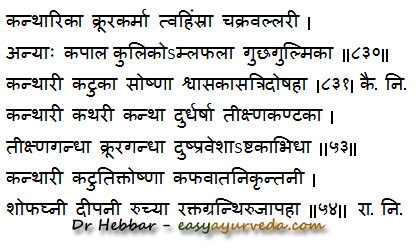Himsra – Capparis sepiaria Uses, Side Effect, Research
Himsra – Capparis sepiaria is used as an ingredient in many Ayurvedic oils and other medicines. It is indicated in digestive disorders, anorexia, asthma, cold, edema, abscess etc. Botanical name- Capparis Sepiaria Linn., Capparis spinosa
Family- Capparidaceae (Varuna Kula)
Table of Contents
Vernacular names
Names in different languages:
Hindi name – Hainsa
Bengali name – Kaliyakara
Oriya name – Kantiphali
Telugu name – Nalla uppi, Nallapuee, Nallapuyyi, Nallaupli, Puyyi, Uppi
Sanskrit Synonyms
Kanthari, Gridranakhi, Nakha, Kala, Krurakarma, Ahimsra, , Amlaphala, Gucchagulmika, Kathari, Durdharsha, Teekshnakantaka, , Krooragandha, Dushpravesha
Vakrakanaki – Thorns are curved
Chakravallari – climber grows in circular manner
Teekshnagandha – It has strong odour
Classical categorization
Sushruta- Kantaka Panchamoola
Kaiyyadeva Nighantu – Oshadhi Varga
Raja Nighantu – Shalmalyadi Varga
Sodhala Nighantu – Lakshmanadi Varga
Distribution, varieties
Distribution: It is distributed in temperate zones of India
Varieties:
Its sub variety – Capparis horrida is identified as Vyaghranakhi by some others.
As per Dalhana,
Himsra – Capparis sepiaria
Ahimsra – Gridhranakhi – Capparis zeylanica
All these have very similar qualities.
Chemical composition
glycosides, flavonoids, reducing sugars, saponins, starch and terpenoids.
Acid insoluble ash (1.70%),
total ash (8.68%),
water soluble ash (3.42%),
water extractive (31.55%),
alcohol extractive (5.06%),
foaming index (105.26 Unit),
loss on drying (9.84%),
swelling index (4.16%),
acute toxicity (nil),
sub-acute toxicity (nil),
chronic toxicity (nil) – Reference
Medicinal properties
Guna (qualities) – Rooksha (dryness), Laghu (lightness)
Vipaka – Katu – Undergoes pungent taste conversion after digestion.
Veerya – Ushna – Hot potency
Effect on Tridosha – Kapha Vatahara – Balances Kapha and Vata Dosha.
Pharmacological action – Stomachic, blood purifier, Ant diabetic
Part used, dosage
Part used- Root, leaf
Dosage-
Decoction 50-100ml
Sanskrit verse

Katu – Pungent taste
Tikta – bitter
Ushna – Hot
Deepani – improves digestion strength
Ruchya – improves taste, relieves anorexia.
Indicated in:
Shwasa – asthma and chronic respiratory disorders
Kasa – cough, cold
Shopha – inflammation
Raktagranthi Ruja – painful abscess
Ayurvedic medicines
Ayurvedic medicines with Capparis sepiaria ingredient:
Lodhrasavam – used in treating piles, heavy menstrual periods, anemia, digestive disorders
Nisosiradi Thailam – used in treating diabetes carbuncles and abscesses.
Sarvamayanthaka Ghritam – herbal ghee used in treating gout, Parkinson’s disease, neck stiffness, locked jaw, paralysis, thigh cramps, muscle cramps
Sahacharadi Thailam – used in treating muscle and joint stiffness and convulsion.
Kottamchukkadi Thailam – Ayurvedic oil used in the treatment of Vata disorders causing neuro muscular pains, sciatica, spondylosis etc.
Eladi Thailam – Ayurvedic oil used for skin conditions.
Side effects
Seek medical advice for its use during pregnancy and lactation.
It can be used in children in small doses.
Interaction with medicines, supplements
Can this be used while taking Homeopathic medicine?
Yes. This product does not react with homeopathic medicine.
Can this medicine be continued while taking supplements like multivitamin tablets, Omega 3 fatty acids etc?
Yes. Generally, this product goes well with most dietary supplements. However, if you are taking more than one product per day, please consult your doctor for an opinion.
With western
medicines
Seek your
doctor’s advice if you are taking this product along with other western
(allopathic / modern) medicines. Some Ayurvedic herbs can interact with modern
medicine.
If both Ayurvedic and allopathic medicines are advised together, then it is
best to take Allopathic medicine first, wait for 30 minutes and then take the
Ayurvedic medicine.
Sthanika Karma (Systemic Action)
Sthanika Karma (Systemic Action)
External Application: Relieve pain and edema. Powder of its Leaf or rhizome can be used in elephantiasis
Internal administration
Nervous system – Helps to reduce pain. Indicated in diseases due to vata origin.
Digestive System – Carminative, Facilitate the flow of enzymes. help the indicated in loss of appetite, liver disorders etc.
Circulatory System – Blood purifier, stimulates the heart, reduces edema.
Tapakrama – Indicated in fever










